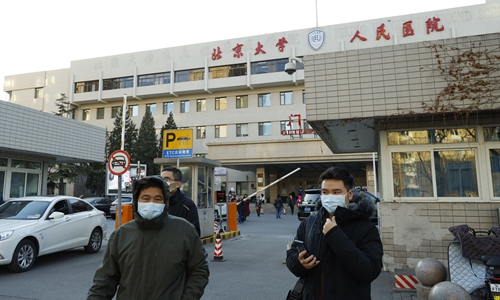HOME >> CHINA,SPECIAL-COVERAGE
Chinese hospitals actively respond to outbreak of novel pneumonia; analysts suggest no need to panic
By GT staff reporters Source:Global Times Published: 2020/1/20 17:03:40

Beijing Chaoyang Hospital Photo: Hu Yuwei/GT
Hospitals in Chinese cities began to implement new and stronger measures on Monday after authorities confirmed 136 new cases the pneumonia-like illness have been found in various parts of the country over the weekend. Hospitals and authorities said the spread of the disease is no cause for panic and none was witnessed in the affected cities and hospitals that were visited by reporters has been felt at the scenes.Global Times reporters visited several hospitals in Beijing and in Shanghai on Monday morning where there were a normal number of people seeking treatment for a fever in emergency wards that remained on high alert for patients who might exhibit signs of the virus.
"Patients whose body temperature surpass especially surpasses 37.3 C need to be checked for the common flu, as it is peak flu season," a nurse at Beijing Chaoyang Hospital told the Global Times on Monday. The hospital is not yet able to screen for the new the coronavirus, the nurse said.
The nurse asked patients if they had recently left Beijing, or travelled to Wuhan in Central China's Hubei Province, where the virus that causes pneumonia-like symptoms originated. The hospital is providing detailed patient information to local authorities as requested .
Global Times reporters saw no indication of panic, and the hospital appeared to be operating normally. "Over the last month, there has been a growing number of patients who have come to the hospital because they have the [common] flu not the coronavirus," said the nurse, who advised people who have recently travelled to Wuhan and have come down with a fever should not go to work, and wear a protective mask around other people.
"There is no need to overreact. If you haven't been in contact with someone with a fever or haven't been to Wuhan, there is little chance you will get infected," the nurse added.
Many residents in Beijing have adopted preventive measures. A 26-year-old man, who works in Beijing and has just returned from his company's annual meeting in Wuhan, told the Global Times that although he doesn't have a fever he decided to come to the hospital to make sure he was not infected.
Another person at the hospital said she had been checked and her temperature was not high, so she was told she could leave. "I don't think people should be panic and believe that our medical development has advanced," the patient who is in her 50s, told the Global Times.
At Beijing Ditan Hospital, a hospital specializing in infectious diseases, some patients and their relatives told the Global Times they were aware they needed to take precautions. "If patients have been in Wuhan they need to register and wait for further symptom screening, otherwise, there is no need to panic," a doctor said.
Ditan Hospital is a government-designated hospital treating infectious diseases in Beijing.

Peking University People's Hospital Photo: Li Hao/GT
Hospitals across the country have vowed to closely watch and observe patients with fevers who had been to Wuhan in last two weeks.Shanghai's Huashan Hospital has posted a large banner showing tips to help prevent the spread of coronavirus. These include properly wash hands, keeping a distance from other patients and other ways of lowering the risk of getting infected. There were very few patients observed by the Global Times at the hospital's fever clinic.
China has made major breakthroughs in responding to infectious diseases including establishing a system for the early detection of 300 known pathogens and the screening, identifying and detection of unknown pathogens, according to the Ministry of Science and Technology.
China has also set up the world's largest network of laboratory for pathogen spectrum monitoring of infectious disease symptoms, including 12 core labs, 91 provincial-level key labs and 800 hospital labs, focusing on detecting the cause of illnesses of the respiratory tract, diarrhea, fever with a rash, fever and bleeding, encephalitis meningitis, the ministry said.
While strengthening the research of emergency treatment technology, the country has been improving the clinical treatment ability of severe cases of sudden acute infectious diseases, with the ability to actively take countermeasures.
Global Times reporters also saw some residents taking preventive measures in different cities. At some pharmacies in Beijing and Shanghai, local residents were seen purchasing protective masks, which has also led to a shortage of the products in some stores.
New cases of coronavirus have now been confirmed in other parts of China, with two patients under treatment in Beijing's Daxing district, and one confirmed and eight suspected cases in Shenzhen, South China's Guangdong Province.
The new coronavirus was first detected in people who worked or visited a seafood market in Wuhan. The number of coronavirus cases in the city has climbed to 198, with 136 new cases confirmed over the weekend.
Experts believe the new strain of pneumonia in Wuhan is no cause for panic, as it has a low risk of human-to-human transmission and a low fatality rate, and China has greatly improved its infectious diseases research, surveillance and diagnosis capabilities since the SARS outbreak in 2003.
Wang Yuedan, a professor of the Department of Immunology at Peking University, told the Global Times that it's very likely the number of confirmed cases will continue to rise, but that the risk of a large-scale outbreak is very low compared with that of SARS in 2003.
Unlike SARS, the pneumonia detected in Wuhan has no high fatality rate and has no "super spreader" that could cause a large number of people to become infected by the virus, Zeng Guang, former chief epidemiologist of the Chinese Center for Disease Control and Prevention, told the Global Times.
Zeng said there is no need to panic as "we will beat the disease just like we beat SARS."
China has greatly improved its epidemiologic research and ability to screen for and detect infectious diseases since the SARS outbreak in 2003, Zeng said.
"We found the pneumonia virus in a very short time, which illustrates our improved overall ability. We found the new coronavirus independently in about 10 days, but during the SARS epidemic, it was foreign experts who found the virus after three or so months," Zeng said.
China has trained a total of 17 groups of epidemiologists since 2003, and they are now working on disease prevention in different provinces and cities, Zeng said.
Yang Zhanqiu, a professor of the Pathogen Biology Department of Wuhan University, told the Global Times that the new virus is evolutionarily different to the SARS virus. At present, efforts are being made to study and understand the characteristics of the virus and clarify its gene sequence.
A lack of research time is the main reason why the source of the coronavirus has not yet been found. The outbreak was initially detected in a seafood market, but was localized. There have not been many outbreaks in seafood and poultry markets, making it difficult to indentify common characteristics, he said.
Climate is another factor. Wuhan has had a mild winter this year, which is suitable for the spread and growth of viruses. This poses challenges for the detection and prevention of viruses,
Zeng said it will take some time for experts to conduct serological tests and develop reagents for the surveillance of the pneumonia.
"We are conducting a dynamic study of the new coronavirus, and it will take time for us to understand the new disease," Zeng said.
Wang noted that massive migration could result in the spread of respiratory diseases, but that any spread ofs pneumonia during the Spring Festival travel period will be under control due to tight surveillance measures.
As for the possible development of a vaccine, Yang said that normally vaccines are not developed for infectious diseases with a fatality rate of less than 1 percent, and that vaccine studies are generally discussed during a late stage of epidemic control.
RELATED ARTICLES:
Posted in: SOCIETY,FOCUS